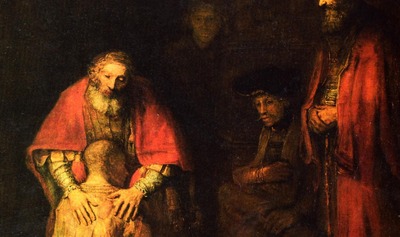April 13, 2025
|by N W
|
0 Comments
|
Father Nixon, Forgiveness, Humility, Love, Mercy, Obedience
Palm Sunday of the Lord’s Passion
April 13, 2025—Year C
Readings: Lk 19:28-40 / Is 50:4-7 / Ps 22 / Phil 2:6-11 / Lk 22:14–23:56
by Rev. Nixon Negparanon, Pastor
Today we stand at the threshold of the most sacred week of the liturgical year. Palm Sunday, also known as Passion Sunday, begins with joyful acclamations as Jesus enters Jerusalem, and quickly moves into the depth of suffering and sorrow, as we read in the Passion narrative. The liturgy swings between triumph and tragedy, praise and persecution. We have palm branches, but we also listen in silence to the Passion. This contrast is intentional. It reflects the reality of our Christian journey, a path of glory that comes through the cross.
Palm Sunday marks the solemn beginning of Holy Week, the most sacred time in the liturgical calendar. It is a day of paradoxes. We begin with the triumphant entry of Jesus into Jerusalem, palms waving and voices raised in joyful acclamation, only to journey with Him into betrayal, suffering, and death. The liturgy captures the shift, moving from celebration to silence, from “Hosanna!” to “Crucify Him!” This liturgical tension invites us to enter not just into an event of the past, but into a mystery that speaks powerfully to our present lives.
The processional gospel of Luke recounts Jesus’ entry into Jerusalem, riding a colt, a sign of humility and peace, rather than military power. The crowds shout, “Blessed is the King who comes in the name of the Lord!” Yet we know that these same voices will later cry out for His crucifixion. This moment fulfills the prophecy of Zechariah 9:9 portraying Jesus as the Messianic King who comes, not to conquer by violence, but to save through self-sacrificing love.
The Church teaches that this act reveals a fundamental truth about God’s kingdom. It is rooted in humility and peace, not power or domination. Jesus is the king who reigns not from a throne of gold, but from the wood of the cross.
In the first reading, the prophet Isaiah introduces us to the suffering servant, a figure who listens obediently to God, offers no resistance to abuse, and endures disgrace with unwavering trust. “I gave my back to those who beat me, my cheeks to those who plucked my beard; my face I did not shield from buffets and spitting.” The Church sees in this passage a foreshadowing of Christ who fulfills this prophecy in His Passion. As the Catechism of the Catholic Church states, “Jesus identifies Himself with the Suffering Servant. He makes Himself an offering for sin, taking upon Himself the suffering due to us. This invites us to see suffering, not as defeat, but as a pathway of redemptive love when united with God’s will.”
Our second reading presents the kenosis of Christ. In Christian theology, kenosis, from the Greek word meaning emptying, refers to the self-emptying of Jesus, particularly His voluntary limitation of His divine powers and the assumption of human form as described in Philippians 2:7-8. Saint Paul, in his letter to the Philippians, presents what is considered one of the earliest Christian hymns. It celebrates the humility of Christ, who though He was in the form of God, emptied Himself, becoming obedient to death, even death on a cross. This self-emptying, or kenosis, leads to His exaltation: “At the name of Jesus every knee should bend and every tongue confess that Jesus Christ is Lord.”
Here we find the heart of Christian discipleship. The path to glory runs through humility. It is by laying down our lives, our pride, our need for control, that we share in Christ’s victory. Christ’s Passion is not merely a tragedy, but a triumph of love over sin and death.
Luke’s account of the Passion offers a deeply human and merciful portrait of Jesus. We witness His anguish in the Garden of Gethsemane, His betrayal, and Peter’s denial. He is unjustly condemned, mocked, scourged, and crucified and yet His compassion never fades. On the cross He prays, “Father forgive them.” To the repentant thief He promises, “Today you will be with Me in paradise.” Even in death, Jesus remains the face of divine mercy.
Our gospel today invites us to recognize the countless ways Christ continues to suffer today, in the poor, the sick, the lonely, the persecuted. His suffering is not abstract. It is personal and He invites us to accompany Him, not as spectators but as disciples willing to carry the cross.
Pope Francis in his Palm Sunday homily of 2020 said, “Let us look to the cross and say, with You, Jesus, I will journey from death to life. Let us take the path of love. Only love can save the world.” This beautifully captures the essence of Palm Sunday. To walk with Jesus through Holy Week is to embrace the mystery of a love that saves through self-giving. We are not merely recalling past events. We are being drawn into them.
What connects all of these reading is the theme of obedient, redemptive love. The Suffering Servant of Isaiah, the humility of Christ in Philippians, and the merciful king in Luke, all reveal that God’s glory is manifested not in domination, but in service and sacrificial love.
Palm Sunday is not just a day of remembrance. It is a day of transformation. It challenges us to ask, “Who is this Jesus I follow? Am I willing to walk with Him, not only in moments of celebration, but also in the shadow of the cross?” The Church encourages us this week to make a spiritual pilgrimage. Through the liturgy, we do not simply observe Jesus’ Passion. We enter into it. We are called to be present in His suffering, to unite our own sufferings with His and to prepare our hearts for the glory of the resurrection.
In a world marked by war, division, pride, and consumerism, the Passion offers a radical counter-narrative. Jesus shows us that true strength lies in humility and that salvation comes through love, not through force. He teaches us to choose humility over self-promotion, to forgive those who hurt us as He forgave, to stand with the suffering, just as Simon, the Cyrenian, helped carry the cross, and love even when it costs us something.
Sometimes we may feel that we run out of hope, but then there is Jesus. Many today carry heavy crosses: the burden of illness, grief, anxiety, and injustice that weigh heavily on their hearts. Palm Sunday invites us, not to look away from this suffering but to enter into it with Christ, walking alongside Him and one another with presence, prayer, and compassion. In moments when we run out of strength and hope, we discover that we are not alone, for then there is Jesus who meets us in our pain and carries us through it. As we carry palms into our homes today, let them be signs of our willingness to follow Christ, not only in moments of glory, but also in the path of the cross. Discipleship means standing by Jesus, not just in triumph, but in suffering.
Holy Week has begun. Let us walk it with reverence, with love, with a heart open to the grace of the Passion. In doing so, we will discover the truth at the heart of our faith: that the way of the cross is the way to life.
KEEP READING
 540-586-8988
540-586-8988 

